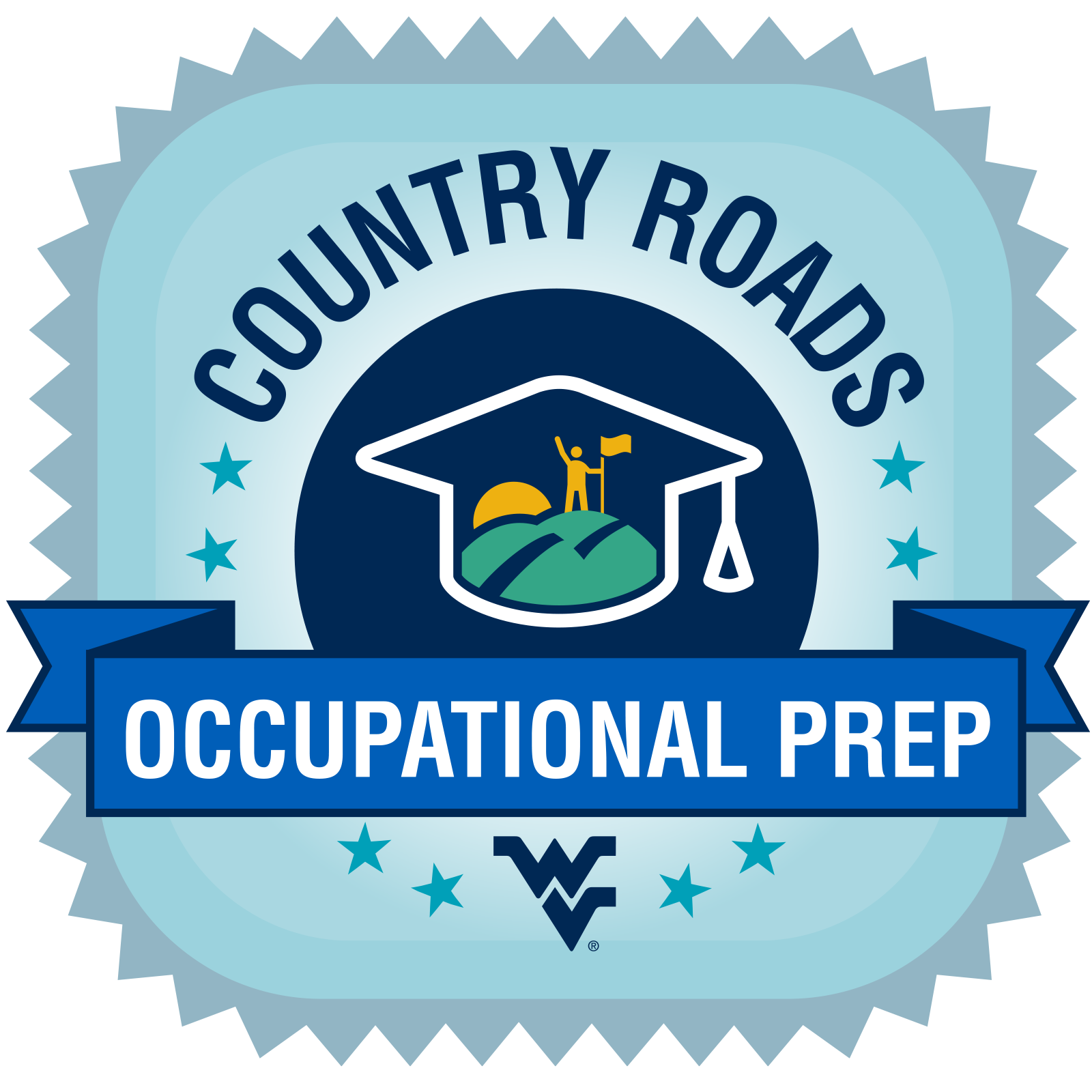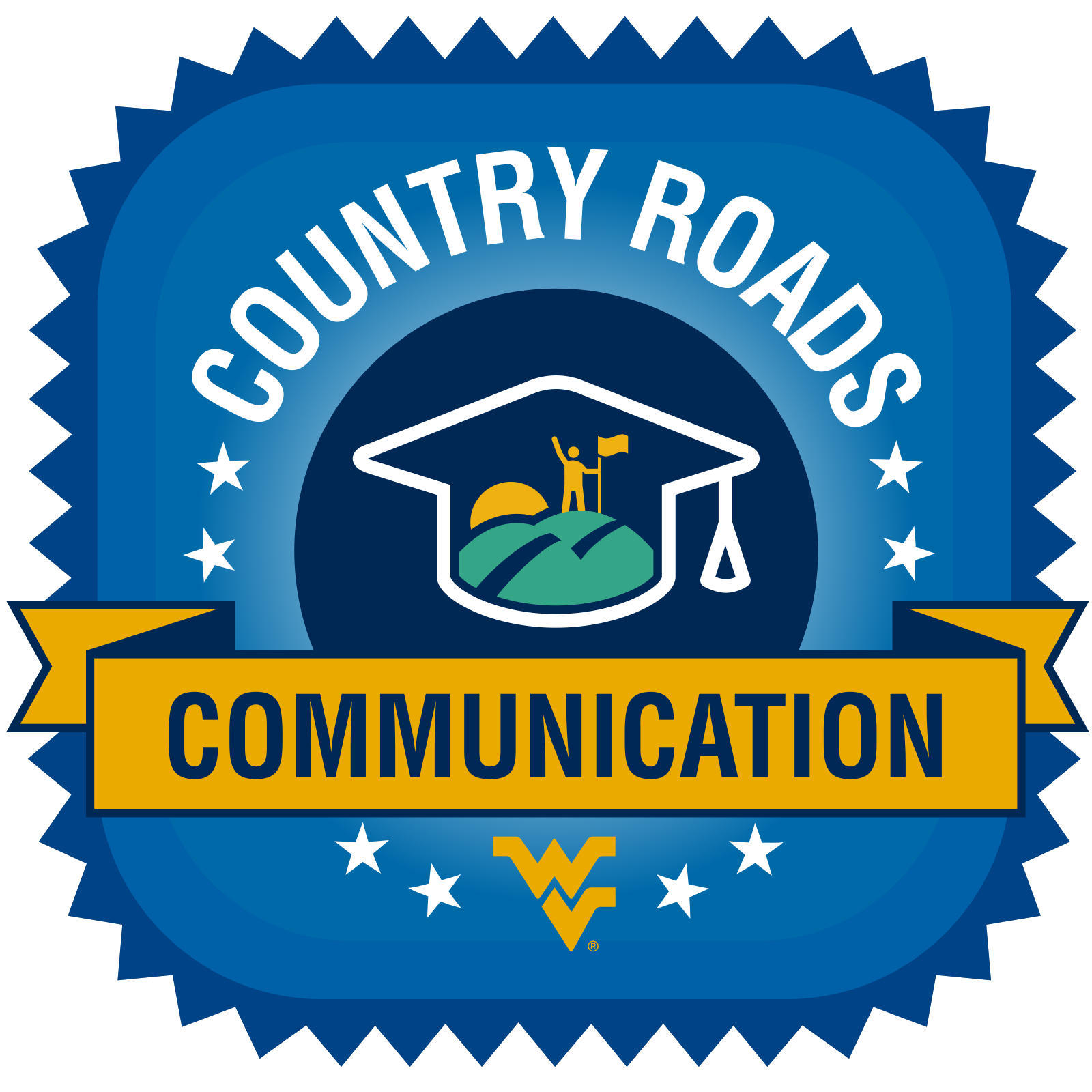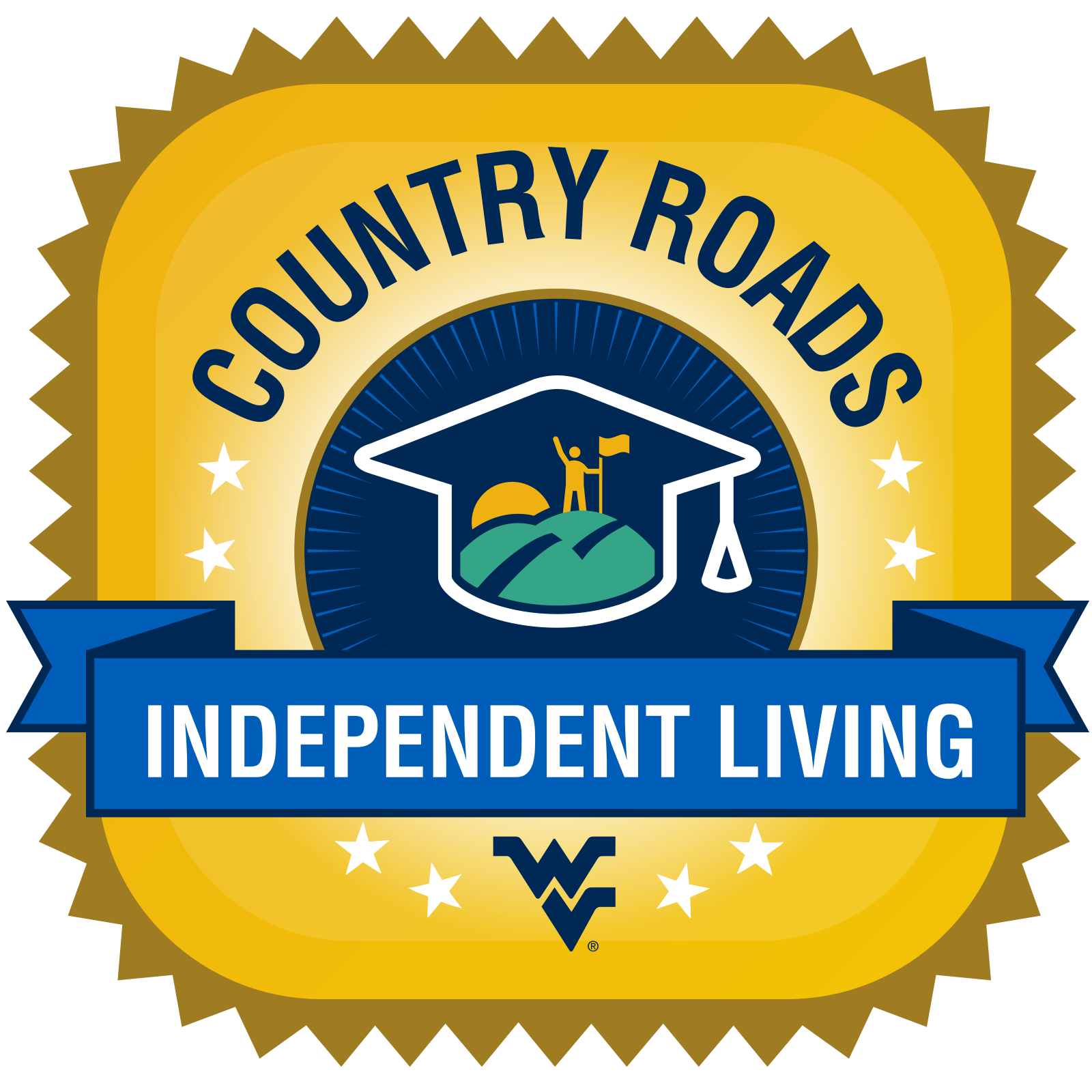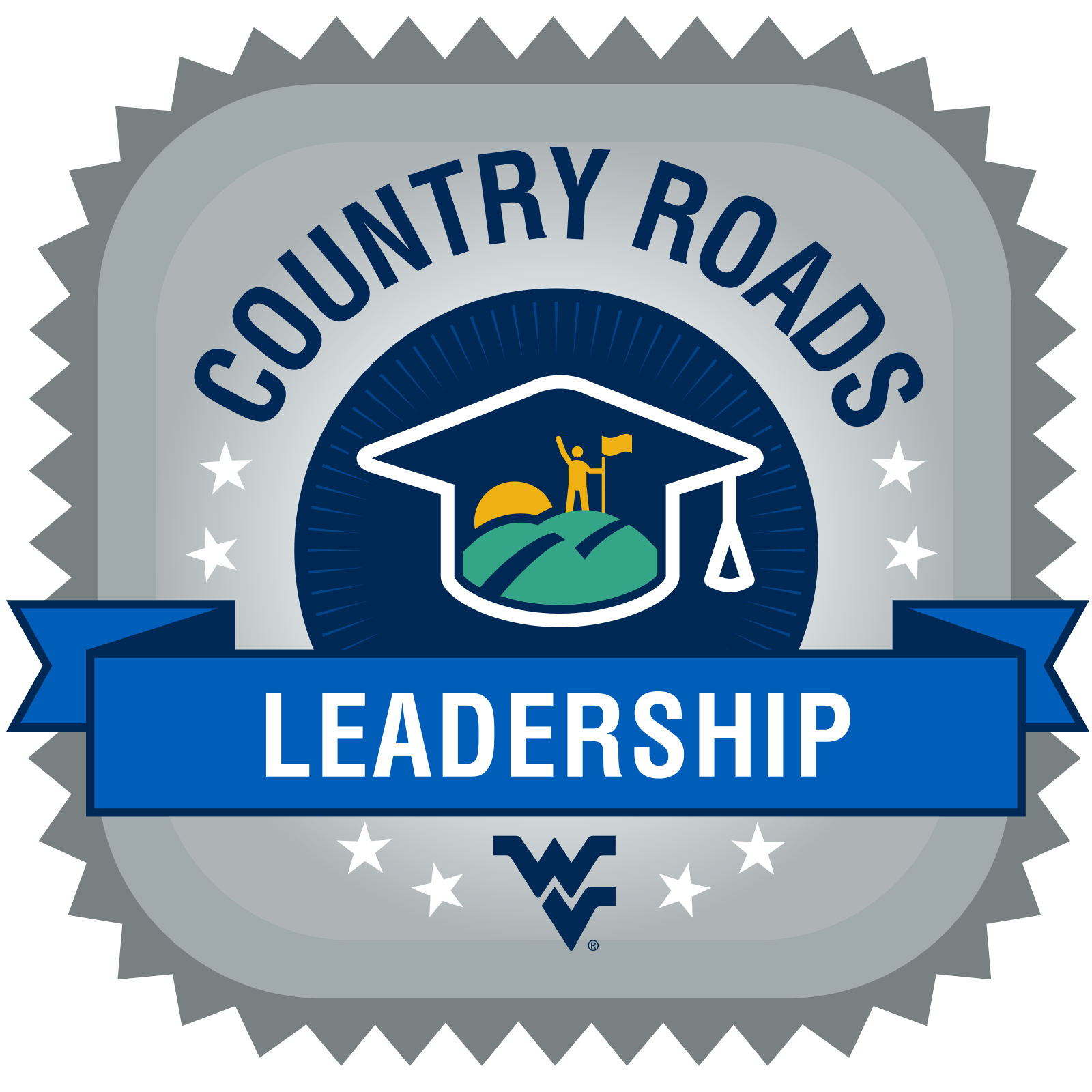Country Roads Micro-Credentials
Each badge is listed and described below in slightly more detail. Please contact Dr. Lesley Cottrell with any questions at lcottrell@hsc.wvu.edu or 304-293-2914.
Occupational Prep

Students enrolled in the Country Roads Program will receive a series of opportunities designed to strengthen their resources and capacity in a way that can be used to reach their occupational interests and goals. For this badge, students will:
- Work on soft skills such as active listening, body language, problem solving, conflict resolution, setting goals, occupational balance, among others.
- Engage in activities that will help build rapport among the group through the engagement of role playing and interactive games.
- Work on short term, or Basic Certificates that will enhance their resumes and skills sets. One of the certificates achieved is the Heartsaver CPR/FA Certificate, provided by the STEPS Center at WVU, which is the Patient Simulation Center on the Health Sciences Campus.
- Participate in a training session provided by the Office of Service and Learning called the Mountaineer Volunteer Program that prepares them for providing service to the community and how to use the tools to track and highlight the skills and experiences they gain as a result. This correlates to the Volunteerism component mentioned throughout the proposal. Other certificates that center on Soft Skill Development will be identified as needs arise.
- Keep an occupational skills portfolio that they can add to, which is also made available online for the students and other teachers to view within SOLE. An example of further Soft Skill training could include activities such as the industry recognized Microsoft Office Certifications, MedCerts, or In Your Eyes Customer Service Training. In subsequent semesters, more technical skills will be identified and students working towards specific career pathways will be directed to engage in these more specific, stackable credentials. For instance, a student that completed the initial CPR/FA class, may want to go into the field of Healthcare, Law Enforcement, or Childcare, all in which case would require more involved trainings and certificates that the student could work towards.
- Complete, review, and apply career assessments and inventories that contribute to building their portfolio, and house information that will be useful for years to come. Students are encouraged to repeat the assessments and surveys, and revisit websites as their career goals and life situations change over the years.
- Engage in a variety of guest speaker and site visit opportunities. The guest presentations incorporate both agencies and employers and are focused on the needs and interests of the cohort. Students are asked which type of employers they would like to hear from at the beginning of the semester, and as identified, and the visits are customized. The site visits also give the students an opportunity to do some trip planning and transportation training, first as a group, and then individually as the semester progresses. These experiences will be customized and coordinated by the Country Roads team and ulitimately directed by the student.
Communication

Communication (written, nonverbal, and verbal) is a focus area throughout the program, but particularly the initial year as students enter the program and experience college life for the first time. To complete this badge, students will:
- Complete a series of credits specifically focused on verbal and nonverbal communications that are essential to relationship building.
- Engage with others in their dorm, courses, on-campus, and within the Morgantown area.
- Discuss and apply knowledge about their relationships (friendships, romantic, colleagues) during the first two years of the curriculum using the evidence based Elevatus curriculum for individuals with I/DD.
- Engage with Peer mentors who serve as crucial liaisons between the Country Roads Program and other students throughout the university to help students transition and find other opportunities for social interaction beyond the core curriculum.
- Complete shadowing placements designed to expand opportunities to build relationships beyond the program.
- Prepare for upcoming social events (e.g., football game) discussing logistics, potential challenges, and reviewing skills needed to navigate those events.
- Role play and other practice with social interactions are used to practice skills before the student independently implements the situation (if needed).
Independent Living

Students live in the Honors dormitory (Lincoln Hall) on the Morgantown campus during the Fall and Spring semesters of their first year. During their second year, they establish and sustain their own apartment or other independent living schedules. Specific daily living skills associated with living independently and/or with others are essential to student success during the program and afterwards. To complete this badge, students will:
- Engage in Experiential Learning:
- All students must follow established procedures and policies within that dorm. Any issues within the dorm are reported and reviewed by existing procedures related to the WVU Diversity, Equity, and Inclusion (Title IX), mental health and safety (Carruth Center), or residential life process.
- Have one roommate from the program and are assigned to two-bedroom suites with other students in the dormitory. Two Residential Assistants (RAs) provide support to each section of the dormitory. This provides real-life experience establishing roommate agreements and relationships, working within a larger group of students who live on the same floor and in the same dorm.
- Complete daily living skills coursework:
- Complete coursework for introductory details about establishing daily living skills and practices across various settings.
- Review the reasons to engage in daily living skills and review the steps involved within the class. They later take that information and practice those steps within a supervised simulated setting.
- Complete daily living and independent skill assessments:
- Complete the Daniel Memorial Independent Living Skills or independent living equivalent baseline assessment at the beginning of the Fall semester their first year. Findings from this assessment are then used by the student and team to identify skill strengths and areas of improvement.
- Review meal plan management, orient to the campus, navigate on and off campus transportation, explore how to identify campus opportunities, and maintain personal hygiene independently.
- Meet with a team occupational therapist to complete an independent living interview. This effort serves two functions. First, findings are used to evaluate progress made during the first semester. The second function the interview serves is to begin to identify areas that should be emphasized in the second semester that relate to living off-campus in the second academic year.
- Review and modify their individual plans as needed for the spring semester. The Office of Accessibility Services modify their respective plans for any areas of improvement and accommodations needed in the Spring across the domains for student occupational preparation, social interactions, and ongoing academic progress. The West Virginia Assistive Technology System (WVATS) provides assistive technology (AT) assessments for each student, demonstrates AT items that may be needed during the semester for any capacity, and works with students to either loan out the item or purchase the item if needed for a long period of time.
- Complete supervised (as needed) activities and responsibilities independently.
- Engage in campus and local community transportation
- Review how to balance work-academic life within the core curriculum, through placements, and in additional peer opportunities
Leadership

Self-determination is the motivation to make, or at least be centrally involved in making, one’s own choices and set their own goals. Self-advocacy and leadership in areas of their own life embody the third badge of the series. For this badge, students will:
- Engage in coursework designed to increase self-awareness, advocacy, and leadership skills. This coursework is provided during both years of the program through evidence-based curricula and leadership series.
- Engage in leadership opportunities, particularly as second year students, in activities across campus and within the program.
- Identify, plan, implement, and evaluate individual plans (PATHS) incorporating personal and occupational goals for the next five years.
- Initiate and sustain discussions about own needs, capacity, and steps required to meet goals.
- Identify and engage in opportunities where leadership and self-representation is strengthened.
